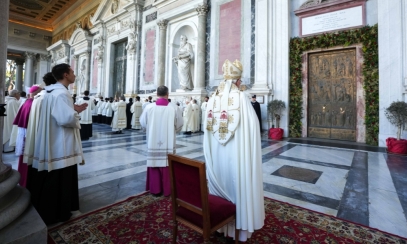
Advent is for those who mourn, for hearts that hope and souls that seek
Several years ago, I was standing in a checkout line behind two women deep in conversation. I couldn’t help overhearing that one was recently widowed and struggling to adjust to this new season of her life. Most of their conversation, however, was drowned out by the lilting strains of “It’s the Most Wonderful Time of the Year” playing over the loudspeakers.
Several years ago, I was standing in a checkout line behind two women deep in conversation. I couldn’t help overhearing that one was recently widowed and struggling to adjust to this new season of her life. Most of their conversation, however, was drowned out by the lilting strains of “It’s the Most Wonderful Time of the Year” playing over the loudspeakers.
That moment of odd juxtaposition reminded me that, for many, the time between Thanksgiving and Christmas holds a measure of sorrow.
Like the stranger shopping with me, many dread their first Christmas without a loved one. Others are facing their second — or ninth, or 27th — Christmas without a loved one when the blessed numbness of that first year has passed and the reality of loss has truly been absorbed.
There are some who expect with dread that this may be the last Christmas they will share with a suffering family member or friend. There are some passing the first season when an adult child will not be able to come home. This may be the first Christmas away from the family home because downsizing or simple economics mean the home was sold and the large table that had long been the setting for family feasts is no more.
It may be the season when a deployment keeps a member of the military away from home — knowing he or she will miss a child’s first Christmas or a grandparent’s last; the first holy season that the elders of a family, with both relief and regret, surrender hosting duties to a younger generation, or the first time that the family chef can no longer make a cherished traditional dish; the season when images of joyful families hurt the hearts of those whose families have borne the pain of divorce and estrangement; or the centrality of children in this season centered on the birth of a child can take a toll on those who ache to have a child and do not or cannot.
Some will face this Advent in poverty, knowing they cannot give their loved ones grand tokens of their affection and fearing that they will disappoint those nearest and dearest come Christmas morning. Others have seen some manifestation of a dark side to human nature — and whatever they have seen has made it far too difficult to hope or rejoice. Others have no time or energy to celebrate because they silently work multiple jobs or scramble to care for those unable to care for themselves. Still others know they will not celebrate Christmas in their own homes because they will be keeping vigil with loved ones in hospitals, hospices and nursing homes.
Some parents will face a great, poignant pain if their children confide they have grown skeptical of God or have left the Church. For some, the cares of life may have robbed them of a bit of their own faith in a season when it is yearned for most.
As we leave ordinary time for our Advent journeys, we enter the season that seems particularly meant for those who carry great burdens. It comes in the darkest days of the year when the nights are the longest and light most scarce. It is a season that recalls the ancient world’s aching wait for Christ, yearning for the tidings of great joy that had not yet come. It is not a season of red and green and gold and silver, but of purple — because the joy promised is hoped for, but not yet here.
If you are facing Christmas this year with sorrow in your heart, I hope that you will find comfort in believing that Advent truly is the season for you. It is the season for all those who hope for what they do not have, and who yearn to see light after a season of darkness. All appearances to the contrary, Advent is not the season of the jolly songs and frantic festivities of Christmas. It is the season for hearts that hope and souls that seek.
If this year has treated you well, I have a gentle suggestion. As Advent gets underway, remember all those you know whose hearts might be aching a bit. Devote some time to them as we enter this season of yearning, waiting, and hoping in the darkness. A visit, an email, a text, a letter, a phone call or the promise of prayer might be exactly what they need to know that they do not wait alone for the light to dawn.
Advent seems the perfect time to assure those who suffer that Advent is, in the words of ancient carols, a time to “rest beside the weary road” until, once again, “a weary world rejoices.” It is a season to help each other move toward Christmas peace by sharing the burdens of ordinary times.
Lucia A. Silecchia is a professor of law and associate dean for faculty research at the Catholic University of America’s Columbus School of Law. Email her at silecchia@cua.edu.



